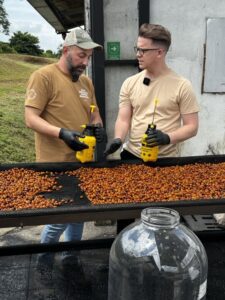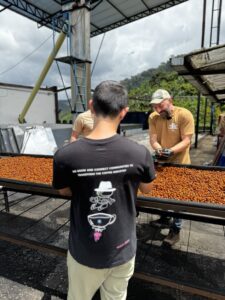


Colombia Zest X Bayter’s Batch 226 BACT
FLAVOUR
Apricot, Yellow Melon, Black Plum, Fig
PRODUCER / Aryan Aqajani & Darren Stinson with Shady & Elias Bayter – Zest X El Vergel Estate
REGION / Fresno, Tolima, Colombia
VARIETAL / SL28
PROCESS / 96 Hour Anaerobic Fermentation with bacteria, Natural
ALTITUDE / 1500 MASL
PRODUCER INFO + BREW RECIPE
BREW RECIPE / FILTER
BREW DEVICE / Origami Dripper
TEMPERATURE / 93C
DOSE / 15G
WATER VOLUME / 225G
BREW TIME / 2:30 Minutes
NUMBER OF POURS / 4
GRIND SETTING / EK43 – 14
BREW RECIPE / ESPRESSO
PRESSURE / 9 BAR
TEMPERATURE / 93.5C at the group head
BASKET / 22G VST
DOSE / 20G
YIELD / 45-60G
TIME / 24-32 Seconds
ZEST X EL VERGEL PROCESSING EXPERIMENT
In July last year, Aryan Aqajani and Darren Stinson set off on a trip through Colombia to find this years gems! Of course, we had to stop off at El Vergel Estate; the flagship farm of our friends at Forest Coffee. With the guidance of the team at El Vergel, including owners Shady & Elias Bayter, Aryan and Darren decided to experiement with some fancy processing using yeast and bacteria’s. Everything was kept the same besides the addition of the yeast, bacteria or both. The first lot, Batch 225, explored the use of yeast in fermentation. Batch 226 then explored the use of bacteria in fermentation, while the third and final lot, Batch 227, combined the two to explore how they worked together during fermentation.
ABOUT BATCH 225
This lot explored how bacteria impacts a coffees profile during anaerobic fermentation. BACT is short for bacteria 😉
Fresh red and yellow SL28 cherries were picked with an initial Brix (a measure of the concentration of sugars) of 18° and pH of 5.2 (measure of acidity). The cherries were then floated to remove defects and then hand-sorted to ensure only ripe cherries moved through to fermentation.
This fermentation involved 80g of Lactobacillus plantarum (lactic acid bacteria) diluted in water at 22°C. The liquid was then evenly sprayed over the cherries. The cherries where then poured into a transparent fermentation tank with an airlock to maintain anaerobic conditions (no oxygen). The fermentation was conducted under shade for 96 hours, leaving the Brix at 14.5° and a pH of 4.3 at the end of the fermentation.
The coffee was then dried in a mechanical dehydrator for 5 days at 36°C operating 24/7. This reduced the cherry moisture to approximately 34%. The cherries where then moved to a silo at 45°C until the beans reached 10-12%.


$45.00 – $71.50Price range: $45.00 through $71.50


